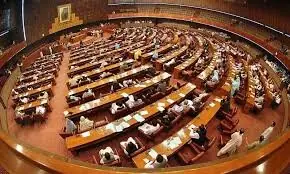27th Amendment Bill: Govt introduces changes to Article 6
The government has decided to introduce additional changes to the 27th Constitutional Amendment Bill, sources said on Wednesday.
Both the government and opposition parties are expected to submit their respective amendments during the ongoing session of the Lower House.
Once approved by the National Assembly, the revised bill will be sent back to the Senate for final approval.
The sources said the government is considering adding three new amendments, which would increase the total number of clauses in the draft from 59 to 62.
One of the key proposed changes pertains to the title of the country’s top judge — replacing the term “Chief Justice” with “Chief Justice of Pakistan” — to remove any legal ambiguity.
Another significant change involves Article 6 of the Constitution, which deals with the offence of “high treason.”
The sources said an amendment is being drafted to clause 2A of Article 6.
Article 6 comprises three clauses — (1), (2), and (2A).
It declares that any person who abrogates, subverts, or suspends the Constitution by use of force, or conspires to do so, commits high treason.
The article states that anyone aiding or abetting such acts shall also be guilty of high treason.
Clause (2A) specifies that no act of high treason may be validated or condoned by any court, including the Supreme Court or High Courts.
Now, under the proposed amendment, no act of rebellion or treason, as described in clauses (1) or (2), would be eligible for validation by any court, including the Federal Constitutional Court, Supreme Court, or High Courts.
The sources added that following the National Assembly’s approval, the additional amendments are likely to be tabled in the Senate tomorrow.
The ruling coalition has instructed all its senators to ensure attendance at tomorrow’s session.
The amendments reportedly seek to clarify the structure of the proposed constitutional court and define judicial positions more precisely.
Once passed by both houses of Parliament, the changes will come into effect.
Meanwhile, the opposition has also decided to table 11 amendments opposing aspects of the bill — particularly those related to changes in the higher judiciary’s structure and the proposed immunity clauses.
Negotiations between the government and opposition on these points are ongoing.
A day earlier, proceedings of the National Assembly were marred by ruckus and protests after Law Minister Azam Nazeer Tarar tabled the bill.
Azam Nazeer Tarar, while moving the motion, said the suo motu powers had previously “become a monster,” and that clearer judicial limits would make the justice system more transparent and effective.
For the latest news, follow us on Twitter @Aaj_Urdu. We are also on Facebook, Instagram and YouTube.























Comments are closed on this story.